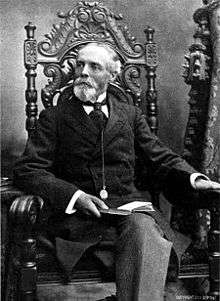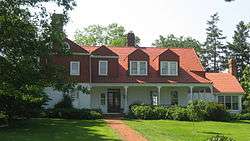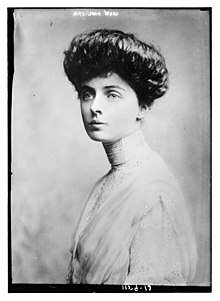Whitelaw Reid
Whitelaw Reid (October 27, 1837 – December 15, 1912) was an American politician and newspaper editor, as well as the author of a popular history of Ohio in the Civil War.[1]
Whitelaw Reid | |
|---|---|
 | |
| United States Ambassador to the United Kingdom | |
| In office June 5, 1905 – December 15, 1912 | |
| President | Theodore Roosevelt William Howard Taft |
| Preceded by | Joseph Choate |
| Succeeded by | Walter Hines Page |
| 28th United States Minister to France | |
| In office May 21, 1889 – March 25, 1892 | |
| President | Benjamin Harrison |
| Preceded by | Robert McLane |
| Succeeded by | T. Jefferson Coolidge |
| Personal details | |
| Born | October 27, 1837 Cedarville, Ohio, U.S. |
| Died | December 15, 1912 (aged 75) London, England, UK |
| Political party | Republican |
| Spouse(s) | Elisabeth Mills (m. 1881; his death 1912) |
| Children | Ogden Mills Reid Jean Templeton Ward |
| Education | Miami University, Oxford (BA) |
| Signature | |
After assisting Horace Greeley as editor of the New-York Tribune, Reid purchased the paper after Greeley's death in late 1872 and controlled it until his own death. The circulation grew to about 60,000 a day, but the weekly edition became less important. He invested heavily in new technology, such as the Hoe rotary printing press and the linotype machine, but bitterly fought against the unionized workers for control of his shop.
As a famous voice of the Republican Party, he was honored with appointments as ambassador to France and Great Britain, as well as numerous other honorific positions. Reid was the party's nominee for Vice President of the United States in the 1892 election. In 1898, President William McKinley appointed him to the American commission that negotiated peace with Spain after the Spanish–American War.[2]
Early life

Reid was born on a farm near Xenia, Ohio, to Robert Charlton Reid (1795–1865) and Marion Whitelaw Ronalds (1804–1895), of the Clan Ronald of Scotland,[3] who had married in 1820. As a child growing up, his family was poor.[4]
Reid attended Xenia Academy in his hometown, and went on to graduate from Miami University with honors in 1856.[5][6] At Miami, he was a member of Delta Kappa Epsilon (Kappa chapter), and lobbied for the expulsion of the six members who ultimately founded Sigma Chi.[7]
Career

During the U.S. Civil War, Reid wrote under the by-line "Agate",[8] acting as a correspondent at several battlefields, including the Battles of Shiloh and Gettysburg. His account of the Battle of Shiloh contains tales of confusion, courage, and disaster narrowly averted, was described as classic war reporting.[9]
In 1868, he joined the staff of Horace Greeley's New-York Tribune. The following year, he was named managing editor. In 1872, Reid was part of the Liberal Republican movement that opposed a second term for President Grant and that ultimately supported the ill-fated Greeley for the presidency. Greeley died just days after the election and a short time later Reid became the new editor of the Tribune.[10][11]
Reid continued the role of the Tribune as one of the foremost Republican newspapers in the country. He emphasized the importance of partisan newspapers in a speech in 1879:
- The true statesman and the really influential editor are those who are able to control and guide parties....There is an old question as to whether a newspaper controls public opinion or public opinion controls the newspaper. This at least is true: that editor best succeeds who best interprets the prevailing and the better tendencies of public opinion, and, who, whatever his personal views concerning it, does not get himself too far out of relations to it. He will understand that a party is not an end, but a means; will use it if it lead to his end, -- will use some other if that serve better, but will never commit the folly of attempting to reach the end without the means....Of all the puerile follies that have masqueraded before High Heaven in the guise of Reform, the most childish has been the idea that the editor could vindicate his independence only by sitting on the fence and throwing stones with impartial vigor alike at friend and foe.[12]
U.S. Ambassador to France
During the Hayes and Garfield Administrations, he was offered diplomatic posts in Germany, both of which he refused. However, upon the election of President Benjamin Harrison, he was offered the role of United States Ambassador to France,[13] which he accepted and served as from 1889 to 1892.[9] While the Ambassador, he rented the palace of the Duke of Gramont, in the Avenue Hoche in the 8th arrondissement of Paris, where he entertained extensively during his three years in office.[14]
During this period of post-Civil War America, Reid's views were similar to many of his contemporaries in that he did not see a need for the United States to exert its influence beyond North and South America. Instead, he favored a small navy and opposed the acquisition of Hawaii.[9] Reid resigned his post in the Spring of 1892 and returned to America.[6]
1892 presidential election and later
In 1892, Reid became the Republican vice presidential nominee when President Harrison chose to drop the sitting Vice President, Levi P. Morton, from the ticket.[15] As Harrison's wife was dying, he was a more active candidate for Vice President than the sitting President. Reid is known for crediting the Republican Party as the party that freed the slaves, preserved the Union, protected labor, built the railroads, and promoted manufacturing.[9] Despite his best efforts, Harrison and Reid lost to the Democratic ticket of Grover Cleveland and Adlai Stevenson, as Cleveland became the first former president to recapture the office.
In 1897, he was appointed a special envoy representing the United States at Queen Victoria's Diamond Jubilee.[14]
In 1898, Reid was given a spot on the peace commission, along with former Secretary of State William R. Day, and Senators William P. Frye, Cushman Kellogg Davis, and George Gray, following the Spanish–American War.[6]
In June 1902, he was again appointed a special envoy representing the United States at the Coronation of King Edward VII and Queen Alexandra,[16] along with J. Pierpont Morgan, Jr., Edmund Lincoln Baylies, and William Wetmore, and brought his wife and daughter to London.[17] The coronation was postponed, however, as the King fell ill, and the rescheduled ceremony in August took place after Reid (and most of the other international representatives) had returned home.[18]
While in London, he received the degree LL.D. honoris causa from the University of Cambridge in June 1902.[19] In 1904, he was made Chancellor of the University of the State of New York. He also received honorary degrees from Dartmouth, Princeton, Yale, Oxford, St. Andrews, Victoria, and Manchester.[6]
U.S. Ambassador to the United Kingdom
In 1905, he was appointed the U.S. Ambassador to the Court of St. James's by Theodore Roosevelt, succeeding Joseph Hodges Choate (1832–1917) in that role.[20][21] Choate's predecessor, John Hay, who became the United States Secretary of State, was Reid's friend of forty years with Reid serving as the best man at Hay's wedding.[22] He served in this role, including during the William Howard Taft administration, until his death in 1912.[23]
Personal life
On April 26, 1881, he married Elisabeth Mills (1857–1931),[24] the daughter of Darius Ogden Mills (1825–1910) and the sister of Ogden Mills (1856–1929).[25] The Reids were social people, and threw lavish parties, including a musicale at their residence in Manhattan, at Madison Avenue and 50th Street, for 400 people, in 1901.[26] Shortly before his death, Reid hosted the Duke and Duchess of Connaught at his New York home.[14] Together, they were the parents of:
- Ogden Mills Reid (1882–1947),[27] who married Helen Miles Rogers (1882–1970),[28] in 1911.[29]
- Jean Templeton Reid (1884–1962),[30] who married Sir John Hubert Ward (1870–1938),[31] the son of William Ward, 1st Earl of Dudley, in 1908.[14][32]
Memberships
In New York, Reid was a member of the University Club, Century Club, Metropolitan Club, Union League Club, and Republican Club of New York. He was president of the Lotos Club for 14 years, and belonged to the Ohio Society, New England Society, St. Andrew's Society, and the American Geographical Society.[14]
From 1902 until his death in 1912, he was a member of Stanford University's board of trustees.[33] Manhattanville College in Purchase, New York, is located on his former Westchester County estate, which was leased to the King and Queen of Siam, Prajadhipok and Rambhai Barni, in 1931.[34]
Descendants
He was the grandfather of prominent journalist and New York Herald Tribune editor Whitelaw Reid (1913–2009) and Ogden Rogers Reid (1925-2019), a former member of the United States House of Representatives.[35]
Death and legacy
Reid died while serving as the ambassador to Britain on December 15, 1912. Upon his death, letters of condolences were sent to the family by King George, Queen Mary, Queen Alexandra, and Princess Victoria.[36] His remains are buried in Sleepy Hollow Cemetery in Sleepy Hollow, New York.
Works
- After The War: A Southern Tour (May 1, 1865 to May 1, 1866.) London: Samson Low, Son, & Marston, 1866. Full text.
- Ohio in the War: Her Statesmen Generals and Soldiers. Cincinnati: Robert Clarke Co., 1895. Vol. 1 & Vol. 2.
- The Greatest Fact in Modern History. New York: Crowell, 1907. Full text.
- American and English studies. New York: Scribner, 1913. Vol. 1 (Government and Education) & Vol. 2 (Biography, History, and Journalism)
Footnotes
- Cortissoz, Royal (1921). The Life of Whitelaw Reid. C. Scribner's Sons. Retrieved 24 April 2017.
- Michael P. Riccards. "Reid, Whitelaw"; American National Biography Online Feb. 2000
- MacDougall, Donald John (1917). Scots and Scots' Descendants in America. Caledonian publishing Company. Retrieved 24 April 2017.
- Broadstone, Michael A. (1918). History of Greene County, Ohio: Its People, Industries and Institutions. B.F. Bowen. p. 331. Retrieved 24 April 2017.
Marion whitelaw ronalds Reid.
- American Authors 1600-1900: A Biographical Dictionary of American Literature (H. W. Wilson Co., New York, 1938)
- Ohio), Miami University (Oxford (1908). Annual Reports of the President, the Deans, and Other Officers of Miami University. Miami University. Retrieved 24 April 2017.
- "Sigma Chi Founding | The Sigma Chi Historical Initiative". history.sigmachi.org. Sigma Chi Historical Initiative. Retrieved 24 April 2017.
- Endres, Fredric F. (1976). A Radical View: The "Agate" Dispatches of Whitelaw Reid, 1861-1865 (review). pp. 361–362. Retrieved 24 April 2017.
- Gephardt, Alan (16 February 2016). "Around and About James A. Garfield: Whitelaw Reid (Part I)". garfieldnps.wordpress.com. The Garfield Observer. Retrieved 24 April 2017.
- Reid, Whitelaw; Fremantle, Sir Arthur James Lyon (January 12, 2009). Two Witnesses at Gettysburg: The Personal Accounts of Whitelaw Reid and A. J. L. Fremantle. John Wiley & Sons. ISBN 9781405181129. Retrieved 24 April 2017.
- "DEATH OF AMBASSADOR REID". The New York Times. 16 December 1912. Retrieved 24 April 2017.
- Whitelaw Reid, American and English Studies, Vol. II (1913), pp. 258-60
- "MR. REID SWORN IN". The New York Times. 19 April 1889. Retrieved 24 April 2017.
- "REID WON FAME IN MANY FIELDS; Had Been a Journalist Half a Century -- Diplomat in Two European Capitals". The New York Times. 16 December 1912. Retrieved 24 April 2017.
- "WHITELAW REID ACCEPTS; LETTER OF THE REPUBLICAN VICE PRESIDENTIAL CANDIDATE. UPHOLDS THE CONSTITUTIONALITY OF A PROTECTIVE TARIFF, AND FEARS A SHOCK TO BUSINESS SHOULD DEMOCRACY TRIUMPH -- INCREASED WAGES -- SOUND CURRENCY DECLARED A REPUBLICAN MEASURE". The New York Times. 19 October 1892. Retrieved 24 April 2017.
- "WHITELAW REID HONORED; A Farewell Banquet at the Union League Club". The New York Times. 15 May 1902. Retrieved 24 April 2017.
- "WHITELAW REID'S ARRIVAL IN LONDON; Special Envoy to the Coronation Has a Busy Day. Calls on Ambassador Choate and Receives Many Visitors, Among Them the Equerries Assigned to Him". The New York Times. 9 June 1902. Retrieved 24 April 2017.
- "Court Circular". The Times (36831). London. 28 July 1902. p. 9.
- "University intelligence". The Times (36787). London. 6 June 1902. p. 11.
- "London Press Welcomes Mr. Reid". The New York Times. 5 June 1905. Retrieved 24 April 2017.
- Times, Special Cable To The New York (28 July 1909). "REID MAY MAKE TRIP HERE.; Ambassador at London Contemplates Visiting America for a Month". The New York Times. Retrieved 24 April 2017.
- Reid, Whitelaw, Ambassador To Great Britain (2 July 1905). "DIPLOMATS HONOR MASTER OF THEIR ART". The New York Times. Retrieved 24 April 2017.
- "ABBEY SERVICE FOR AMBASSADOR REID | King's Wish Insures Westminster Exercises - Warship to Bring the Body Home. TAFT WILL NOT FILL VACANCY His First Purpose to Name Successor is Given Up Out of Courtesy to President-Elect Wilson". The New York Times. 17 December 1912. Retrieved 24 April 2017.
- Times, Special Cable To The New York (30 April 1931). "MRS. WHITELAW REID IS DEAD IN FRANCE; Widow of the Former U.S. Ambassador to England a Victim of Pneumonia.A FAMOUS PHILANTHROPIST Made Lavish Gifts to Many Causes--Hostess to Royalty DuringBrilliant London Career. Services in Paris Likely". The New York Times. Retrieved 24 April 2017.
- "REID-MILLS.; DR. MORGAN CONDUCTS THE CEREMONY AT MR. D.O. MILLS'S HOUSE". The New York Times. 27 April 1881. Retrieved 24 April 2017.
- "MR. AND MRS. REID'S MUSICALE.; Mme. Melba and Other Artists Sing -- More than 300 Guests Present". The New York Times. 14 February 1901. Retrieved 24 April 2017.
- "OGDEN MILLS REID OF HERALD TRIBUNE DIES OF PNEUMONIA; Ogden Mills Reid Dies of Pneumonia". The New York Times. 4 January 1947. Retrieved 24 April 2017.
- Times, Special To The New York (28 July 1970). "MRS. OGDEN REID DIES HERE AT 87". The New York Times. Retrieved 24 April 2017.
- Times, Special To The New York (15 March 1911). "OGDEN MILLS REID WEDS.; Son of Ambassador Whitelaw Reid Married to Miss Helen M. Rogers". The New York Times. Retrieved 24 April 2017.
- "LADY WARD DEAD; AIDED CHARITIES; Daughter of Whitelaw Reid Was 78--Wed in Palace". The New York Times. 3 May 1962. Retrieved 24 April 2017.
- "SIR JOHN WARD, 68, IS DEAD IN LONDON; Whitelaw Reid's Son-in-Law Had Served Four British Sovereigns as Equerry ROYALTY AT HIS MARRIAGE Boer and World Wars Veteran Had Been Decorated by France and Italy King Pleased by Marriage Son of First Earl Member of Victorian Order". The New York Times. 3 December 1938. Retrieved 24 April 2017.
- "AMBASSADOR REID'S DAUGHTER ENGAGED; Formally Announced by Her Parents She Will Wed the Hon. John Hubert Ward. EARL OF DUDLEY'S BROTHER Equerry in Waiting to King, Racing Man, Sportsman, and Six Feet High -- Wedding This Summer. Bingham Accused of Contempt". The New York Times. 30 April 1908. Retrieved 24 April 2017.
- Elliott, Orrin Leslie (1937). Stanford University: The First Twenty-five Years. Stanford University Press. p. 466.
- Photo, International (5 April 1931). "WHERE ROYALTY WILL RESIDE". The New York Times. Retrieved 24 April 2017.
- "REID, Ogden Rogers - Biographical Information". bioguide.congress.gov. Biographical Directory of the United States Congress. Retrieved 13 June 2017.
- Times, Marconi Transatlantic Wireless Telegraph To The New York (16 December 1912). "WHITELAW REID DIES IN LONDON; Editor and Diplomat Passes Away at Dorchester House After Brief Illness". The New York Times. Retrieved 24 April 2017.
Further reading
- Baehr, Harry William. The New York Tribune Since the Civil War. New York: Dodd, Mead and Co., 1936.
- Cortissoz, Royal. The Life of Whitelaw Reid. Two volumes. New York: Charles Scribner's Sons, 1921.
- Duncan, Bingham. Whitelaw Reid: Journalist, Politician, Diplomat. Athens, GA: University of Georgia Press, 1975.
- McSweeney, Edward F. The Arch Enemy of Labor: Record of His Duplicity and Violated Pledges: Fifteen Years of Merciless War upon Labor Organizations. New York: Labor Educational Bureau, n.d. [1892].
External links
| Wikimedia Commons has media related to Whitelaw Reid. |
| Wikisource has original works written by or about: Whitelaw Reid |
- Works by Whitelaw Reid at Project Gutenberg
- Works by or about Whitelaw Reid at Internet Archive
- Modern Eloquence: Vol III, After-Dinner Speeches P-Z at Project Gutenberg, contains two speeches by Reid.
- Abraham Lincoln by Whitelaw Reid
- Byron. Address at University College, Nottingham, on Speech day, 29th Nov., 1910, for the Byron chair of English literature by Whitelaw Reid
- One Welshman: a glance at a great career. Inaugural address, autumn session, University College of Wales, Aberystwyth, October 31st, 1912 by Whitelaw Reid
- Our new duties: a commencement address at the seventy-fifth anniversary of Miami university, Thursday, June 15, 1899 by Whitelaw Reid
- Whitelaw Reid at Find a Grave
| Diplomatic posts | ||
|---|---|---|
| Preceded by Robert McLane |
United States Ambassador to France 1889–1892 |
Succeeded by T. Jefferson Coolidge |
| Preceded by Joseph Choate |
United States Ambassador to the United Kingdom 1905–1912 |
Succeeded by Walter Hines Page |
| Party political offices | ||
| Preceded by Levi P. Morton |
Republican nominee for Vice President of the United States 1892 |
Succeeded by Garret Hobart |

